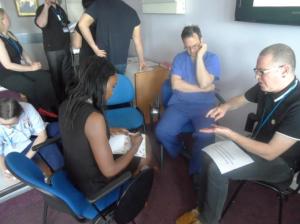Julie Wells, Director of Transforming Health Ltd explains how the Macmillan Values Based Standard can help drive genuine improvements in patients’ and families’ experience of care
What have the following got in common?
- A name board that shows what a patient prefers to be called
- A health care assistant who spends time at the end of their shift ‘just sitting’ and listening to patients
- A new way of ensuring when patients first see themselves after head and neck surgery, this process is handled with care and sensitivity
- New systems in primary care for handing a death certificate to a family member
- New ways of listening to the experience of families whose loved ones have been cared for by a hospice at the end of their lives
The common element to all of these initiatives is that they have been thought up and put in place by frontline NHS staff as a result of the team implementing the Macmillan Values Based Standard ® (VBS).The VBS framework’s eight domains focus on the relational aspects of care and set out practical examples of behaviours that matter most to patients and staff.
 Teams work through the VBS framework and consider first, what they believe they do well and/or what needs improvement, and second what data/evidence they have to support these beliefs. Inevitably there are ‘data gaps’. For example, there might be limited data on staff’s experience of working in the team, or on whether people are actually called the name they wish to be called by. However, it is surprising how much data teams can access, including national data sets such as the Cancer Patient Experience Survey (CPES) and more local routine data, for example surveys of patients as they leave the ward.
Teams work through the VBS framework and consider first, what they believe they do well and/or what needs improvement, and second what data/evidence they have to support these beliefs. Inevitably there are ‘data gaps’. For example, there might be limited data on staff’s experience of working in the team, or on whether people are actually called the name they wish to be called by. However, it is surprising how much data teams can access, including national data sets such as the Cancer Patient Experience Survey (CPES) and more local routine data, for example surveys of patients as they leave the ward.
Once the team has built a picture of what it’s like to be a patient in their care, including first-hand accounts from patients and importantly, what it’s like for staff, this data is fed back to the wider multidisciplinary team. This is where the innovation takes place with all those attending encouraged to come up with creative solutions in the most pressing areas.
 The wider the staff group who attend the events the better. Once the wider team know that data from their own patients, quantitative and qualitative, will be fed back, as well as the experience of staff, there is usually great interest in knowing ‘how we are doing’. This is an important opportunity to engage the wider team and to show how the data can be triangulated to promote a powerful case for change.
The wider the staff group who attend the events the better. Once the wider team know that data from their own patients, quantitative and qualitative, will be fed back, as well as the experience of staff, there is usually great interest in knowing ‘how we are doing’. This is an important opportunity to engage the wider team and to show how the data can be triangulated to promote a powerful case for change.
Once ideas for action have been pooled, small groups of staff are then encouraged to work together and to involve patients to design and test the change and assess whether it leads to an improvement. Ongoing measurement and reference to the original baseline is vital. This is not a project. It is a way of working and staff are encouraged to continuously reflect on their practice and how the values contained within the VBS framework are being put into practice. This is to improve and sustain part of the work. The cycle of discovery then begins again, building the skills of the team for continuous improvement in both patient and staff experience of care.
NHS Improving Quality is working with NHS England and Macmillan Cancer Support to explore how the NHS is using the Cancer Patient Experience Survey (CPES) data to reduce variation in patient experience, and support improvements across the process of care. www.nhsiq.nhs.uk/CPES


